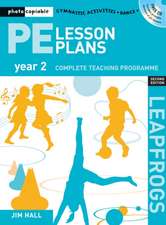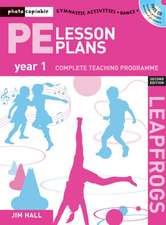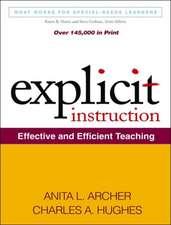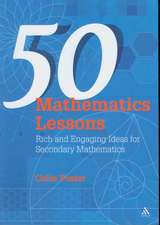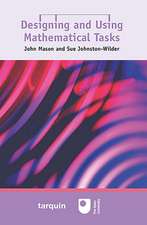Modelling Learners and Learning in Science Education: Developing Representations of Concepts, Conceptual Structure and Conceptual Change to Inform Teaching and Research
Autor Keith S. Taberen Limba Engleză Hardback – 2 ian 2014
This highly useful work provides models of scientific thinking from different field and analyses the processes by which we can arrive at claims about the minds of others. The author highlights the logical impossibility of ever knowing for sure what someone else knows, understands or thinks, and makes the case that researchers in science education need to be much more explicit about the extent to which research onto learners’ ideas in science is necessarily a process of developing models.
Through this book we learn that research reports should acknowledgethe role of modeling and avoid making claims that are much less tentative than is justified as this can lead to misleading and sometimes contrary findings in the literature. In everyday life we commonly take it for granted that finding out what another knows or thinks is a relatively trivial or straightforward process. We come to take the ‘mental register’ (the way we talk about the ‘contents’ of minds) for granted and so teachers and researchers may readily underestimate the challenges involved in their work.
| Toate formatele și edițiile | Preț | Express |
|---|---|---|
| Paperback (1) | 785.42 lei 6-8 săpt. | |
| SPRINGER NETHERLANDS – 17 sep 2016 | 785.42 lei 6-8 săpt. | |
| Hardback (1) | 791.57 lei 6-8 săpt. | |
| SPRINGER NETHERLANDS – 2 ian 2014 | 791.57 lei 6-8 săpt. |
Preț: 791.57 lei
Preț vechi: 965.33 lei
-18% Nou
Puncte Express: 1187
Preț estimativ în valută:
151.46€ • 158.14$ • 125.36£
151.46€ • 158.14$ • 125.36£
Carte tipărită la comandă
Livrare economică 04-18 aprilie
Preluare comenzi: 021 569.72.76
Specificații
ISBN-13: 9789400776470
ISBN-10: 9400776470
Pagini: 225
Ilustrații: XIX, 364 p. 83 illus.
Dimensiuni: 155 x 235 x 27 mm
Greutate: 0.72 kg
Ediția:2013
Editura: SPRINGER NETHERLANDS
Colecția Springer
Locul publicării:Dordrecht, Netherlands
ISBN-10: 9400776470
Pagini: 225
Ilustrații: XIX, 364 p. 83 illus.
Dimensiuni: 155 x 235 x 27 mm
Greutate: 0.72 kg
Ediția:2013
Editura: SPRINGER NETHERLANDS
Colecția Springer
Locul publicării:Dordrecht, Netherlands
Public țintă
ResearchCuprins
Modelling learners and learning in science education.- Modelling mental processes in the science learner.- Modelling the science learner’s knowledge.- Development and learning.- Conclusion.
Textul de pe ultima copertă
This book sets out the necessary processes and challenges involved in modelling student thinking, understanding and learning. The chapters look at the centrality of models for knowledge claims in science education and explore the modelling of mental processes, knowledge, cognitive development and conceptual learning. The conclusion outlines significant implications for science teachers and those researching in this field.
This highly useful work provides models of aspects of scientific thinking and learning, drawing upon different fields and analyses the processes by which we can arrive at claims about the minds of others. In everyday life we commonly take it for granted that finding out what another knows or thinks is a relatively trivial or straightforward process. We come to take the 'mental register' (the way we talk and think about the 'contents' of minds) for granted and so teachers and researchers may readily underestimate the challenges involved in their work.
The author highlights the logical impossibility of ever knowing for sure what someone else knows, understands or thinks, and makes the case that researchers in science education need to be much more explicit about the extent to which research into learners' ideas in science is necessarily a process of developing models. Through this book we learn that research reports should acknowledge the role of modelling and avoid making claims that are much less tentative than is justified as this can lead to misleading and sometimes contrary findings in the literature.
This highly useful work provides models of aspects of scientific thinking and learning, drawing upon different fields and analyses the processes by which we can arrive at claims about the minds of others. In everyday life we commonly take it for granted that finding out what another knows or thinks is a relatively trivial or straightforward process. We come to take the 'mental register' (the way we talk and think about the 'contents' of minds) for granted and so teachers and researchers may readily underestimate the challenges involved in their work.
The author highlights the logical impossibility of ever knowing for sure what someone else knows, understands or thinks, and makes the case that researchers in science education need to be much more explicit about the extent to which research into learners' ideas in science is necessarily a process of developing models. Through this book we learn that research reports should acknowledge the role of modelling and avoid making claims that are much less tentative than is justified as this can lead to misleading and sometimes contrary findings in the literature.
Caracteristici
Offers an integrated account of the modelling processes involved in research into student understanding and learning in science Emphasises the case for the importance of acknowledging the modelling processes necessarily underpinning any account of student thinking, knowledge or learning Reviews the current state of knowledge in science education in relation to the modelling of scientific thinking, understanding and learning in science Develops the personal constructivist perspective on learning





